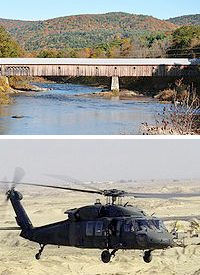
With all six of its National Guard's Black Hawk helicopters still deployed in Iraq, flood-devastated Vermont received help from neighboring New Hampshire and distant Illinois this week in bringing relief to residents stranded in 13 communities after flooding caused by last weekend's Tropical Storm Irene washed out hundreds of the state's roads and bridges.
On Monday, the New Hampshire National Guard sent over two of its Black Hawk helicopters, which transported Federal Emergency Management Agency Administrator Craig Fugate and Vermont's Gov. Peter Shumlin, U.S. Sen. Bernie Sanders, and U.S. Rep. Peter Welch on a survey of flood-damaged areas in the state. On Wednesday the first of eight helicopters on loan from the Illinois National Guard arrived to help with the distribution of food and other supplies as Vermonters continued to struggle with the after effects of the storm that flooded homes, business, and government offices. Illinois Governor Pat Quinn ordered the helicopters and 95 members of the Illinois Guard to Vermont from Rome, New York, where they had been sent to assist in flood relief efforts in that state.
About 200 National Guard members from Maine and 50 from West Virginia were also enroute to Vermont, the Boston Globe reported on Friday. The West Virginia unit, bringing 20 dump trucks, and Maine soldiers from the 262 Engineers unit will assist in repairing roads in and around the stranded communities in the Killington and Mendon areas, the Boston Globe reported.
Six massive, double-bladed Chinook choppers and two smaller Black Hawk helicopters on loan from Illinois are being used along with the New Hampshire Black Hawks in the relief effort. The Vermont National Guard has been making deliveries in the two Lakota and two Kiowa helicopters it has available. Those choppers are much smaller than the Black Hawks and the amount of food and supplies they have been able to carry is far less than what is needed. One Lakota flight delivered 48 military Meals Ready to Eat (MRE) to the flood-stranded town of Rochester and its 1,100 residents, the Burlington Free Press reported.
Vermont's six Black Hawks and 55 National Guard members are due back from Iraq in a few days, but it could be as a long as a month before the helicopters will be ready for use on the home front. The aircraft will have to undergo extensive maintenance, including the removal of desert sand and grit from component parts before they will be redeployed.
"We'd be in a different scenario if they were here," Lieutenant Lloyd Goodrow, spokesman for the Vermont guard told the Free Press, noting the strain the overseas commitment can place on the ability to respond to local disasters.
"Our primary federal mission is a combat mission in Iraq that is saving lives," he said. "And we are able to reach out across state lines at home to allow us to do both our state and federal missions."
In some cases, the time it takes for help to arrive from distant states could be a matter of life and death. Critics of the Iraq and Afghanistan wars have claimed at various times that waging war in the Middle East has diminished America's ability to respond to disasters at home. A Department of Defense assessment of the response to Hurricane Katrina in 2005 noted that "significant attention" had been paid to "the question of whether the demands of overseas operations in Iraq and Afghanistan in any way affected the quality of response of both active duty and National Guard forces. Both DOD and the National Guard have denied any deleterious effect; however, there is some anecdotal evidence that equipment shortages among National Guard units and the non-availability of some active duty units could be attributed to overseas deployment."
An ABC News report in May of 2007 found that many states, including several in the Midwest and Western regions, had most of their helicopters deployed in overseas combat operations and few left for fighting floods, wildfires, and other natural disasters. National Guards in Kansas, Texas, and Montana reported the vast majority of their helicopters were deployed out of state, mostly in Iraq and Afghanistan. Nebraska's contingent of Black Hawk helicopters was deployed in Iraq. A backup system of sharing aircraft is of limited help when a number of neighboring states have all or most of their helicopters overseas, Melvyn Montano, retired adjutant of New Mexico, told ABC.
"Where are they going to tap their equipment from if they've all been deployed?" he asked.
Photo: A covered bridge in Vermont (top) and a Black Hawk helicopter in Iraq (bottom)



